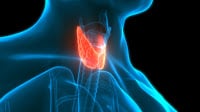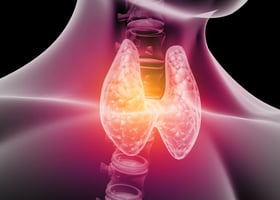Hypothyroidism in Dementia Patients Often Overtreated, Study Suggests

Dementia screenings often include thyroid evaluations, as there is some evidence that hypothyroidism—characterized by elevated thyroid-stimulating hormone (TSH) and reduced thyroid hormone levels—may contribute to cognitive problems. A study in Journal of the American Geriatrics Society now reports that older adults with hypothyroidism and dementia are more likely to receive too high a dose of thyroid hormone supplements or not enough compared with older adults with hypothyroidism who do not have dementia.
“With millions of individuals older than 70 years of age living with various forms of dementia, understanding the impact of clinical practice patterns can help clinicians start to individualize their approach to TSH elevation in older adults with dementia, which is critical to optimizing care,” wrote Enoch J. Abbey M.D., M.P.H., of Johns Hopkins University and colleagues.
Abbey and colleagues looked at data from HealthABC, a longitudinal study that began tracking the health outcomes of 3,075 adults aged 70 to 79 living independently in Memphis or Pittsburgh in 1997-1998. At the start of the study, none of the participants had dementia. In the second year of the study, 2,798 participants who were not taking anti-thyroid drugs for hyperthyroidism received TSH and cognitive testing. TSH levels between 0.45 and 4.5 mIU/L were considered normal.
During the second year of the study, 2.3% of the participants developed dementia. Compared with adults without dementia, those with a dementia diagnosis were slightly more likely to be taking thyroid hormone supplements (12.9% vs. 9.8%), the authors wrote. Older adults without dementia were much more likely to have elevated TSH that was not being treated with thyroid hormone supplements (10.7% vs. 1.9%). Abbey and colleagues said this discrepancy likely results from an aggressive attempt to treat hypothyroidism in dementia patients.
Further calculations showed that older adults with dementia who received thyroid supplements were 2.4 times as likely to not be receiving a high enough dose of thyroid hormone supplements (still had TSH levels above 4.5 mIU/L) and 10 times as likely to receive too high a dose of thyroid hormone supplements (TSH levels below 0.45 mIU/L) than older adults without a dementia diagnosis taking thyroid hormone supplements.
“If low TSH … levels are risk factors for dementia progression, and this status often results from thyroid hormone use, prescribing supplementation for emerging cognitive dysfunction has the potential to exacerbate cognitive decline,” Abbey and colleagues noted.
To read more on this topic, see the Psychiatric News article “Worse Outcomes in Patients With Depression Linked to Low Thyroid Hormones.”







